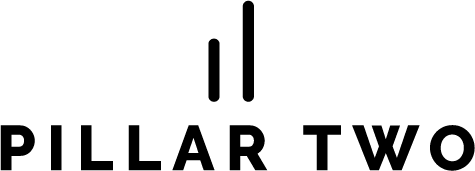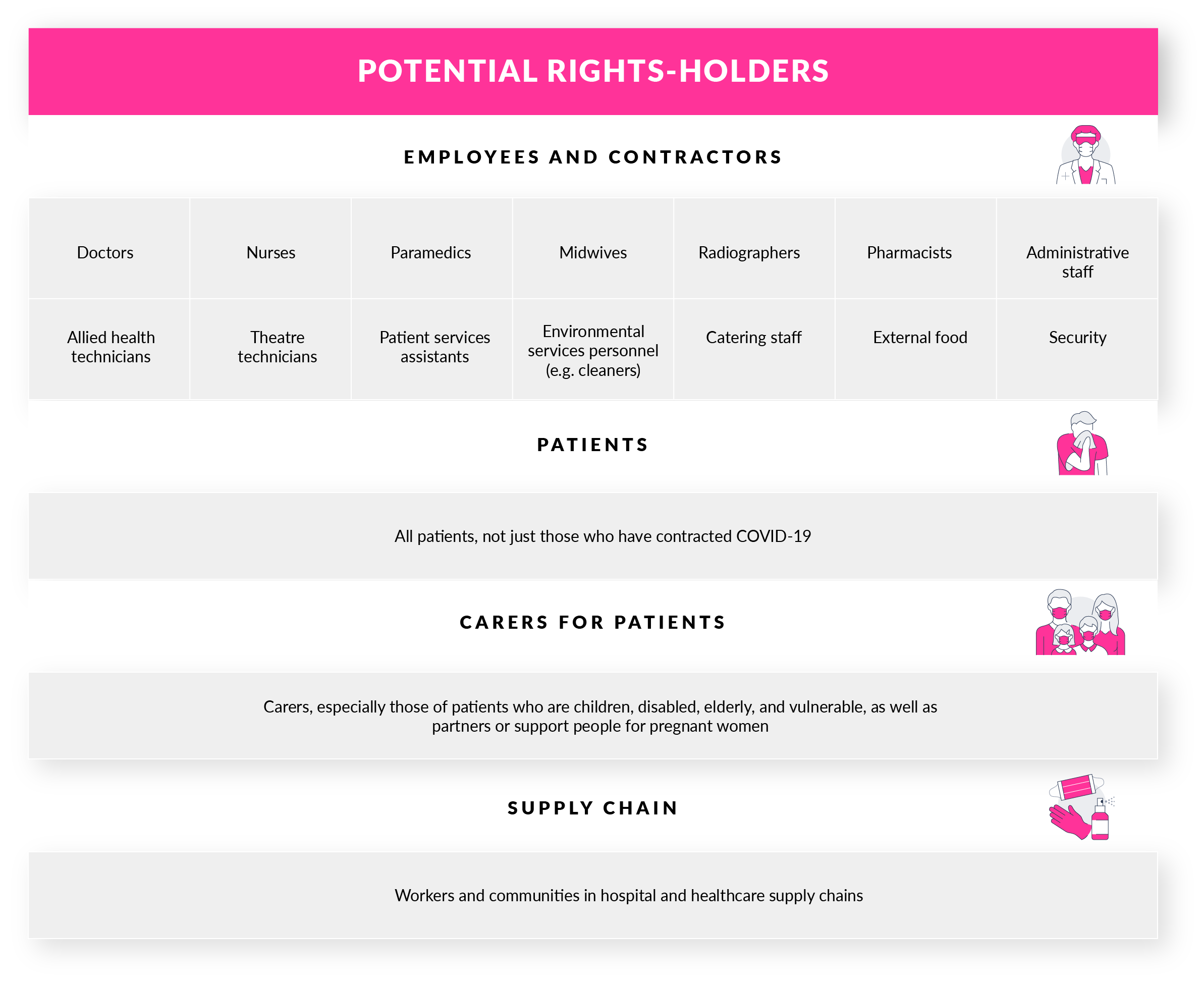How can hospitals & other healthcare service providers respect human rights during COVID-19, & how can the business community support them?
VANESSA ZIMMERMAN | CEO &
RIANA CERMAK | ADVISOR
The COVID-19 pandemic has presented new human rights risks and exacerbated existing challenges. In this article, we explore the unique challenges facing hospitals and healthcare service providers, and provide guidance based on the UN Guiding Principles on Business and Human Rights (UNGPs). We follow by exploring how other businesses can provide support to hospitals through during types of challenges .
This is a time of extreme difficulty for hospitals and other healthcare service providers – with capacity under strain and significant external pressures. The UNGPs articulate the state duty to protect human rights, and the corporate responsibility to respect human rights even in times of crisis. But what does this mean in practical terms for hospitals and healthcare providers during the COVID-19 crisis?
Australia’s healthcare system is made up of public and private organisations, with each having different responsibilities under the UNGPs. While both public and private hospitals have the responsibility to respect human rights (to do no harm and to remediate where harm occurs), public hospitals like other state-owned enterprises (SOEs) may have an even greater obligation to set an example and the duty to protect human rights. The crisis has also resulted in the Australian Government partnering with private hospitals to integrate with the public health system, making infrastructure, essential equipment, supplies and workforce fully available to the public system, which creates further complexities for hospitals navigating human rights during this time.
The UNGPs provide guidance for SOEs that has been clarified by the United Nations Office of the High Commissioner for Human Rights (OHCHR) in its 2016 report on SOEs and the UNGPs. All hospitals and healthcare providers have the responsibility to respect human rights under the UNGPs – but this is complementary to the state duty to protect, with governments required to “take additional steps to protect against abuses by the enterprises they own or control”. In particular, the UNGPs require that SOEs “lead by example on business and human rights”.
Increased Human Rights Risks During Covid-19
The UNGPs advise that where prioritisation is necessary businesses should first seek to prevent and mitigate those human rights harms that are most severe or where delayed response would make them irremediable. The UNGPs therefore recommend periodic reviews of a business’ salient, or most severe, human rights risks, which will be particularly relevant in times of rapid change or crisis. Importantly saliency should be viewed in terms of the most severe risks to human beings, not risks to a business, though the two often intersect with reputational, operational and in some cases legal consequences for businesses failing to respect human rights.
At all times, the activities of hospitals and healthcare service providers can impact on a number of internationally recognised human rights, including the right to life, the right to health, labour rights and worker welfare, freedom from modern slavery, the right to privacy, and freedom of expression. The activities can impact numerous potential rights-holders, some of which we have mapped out below.
While workers around the world are being encouraged – and some required by law – to work from home, this is not possible for healthcare and other frontline workers. According to the World Health Organisation (WHO), healthcare workers are at increased risk of “pathogen exposure, long working hours, psychological distress, fatigue, occupational burnout, stigma, and physical and psychological violence.”
To protect against COVID-19, these workers themselves require adequate personal protective equipment (PPE) and training. Early in the crisis, the UN Special Rapporteur on Hazardous Substances called on states and businesses to “urgently step up their efforts to ensure that healthcare workers fighting the COVID-19 pandemic worldwide receive adequate protective equipment.” However, throughout the crisis, there have been numerous examples globally of shortages of PPE for healthcare workers, hospital staff being unable to access PPE, hospital staff making their own PPE out of office supplies and, as the crisis continues, reports of staff from hospitals, aged care facilities, and disability services facing dangerous situations due to continued shortages. There have also been reports of healthcare workers threatened with disciplinary action for whistleblowing on shortages of PPE in hospitals.
The constant need to wear PPE has raised other issues, with continued use reportedly “tak[ing] a physical toll. It’s hot and there’s a risk of dehydration. The greatest physical burden is often borne by nurses who have the most direct contact with patients.”
Other heightened risks include healthcare workers required to self-isolate from family members being unable to afford secondary housing, the risk of overwork, and mental health concerns.
While hospitals are working to increase supplies of PPE, this can also create tension between rapidly increased production and ensuring that workers and communities in supply chains are protected from adverse human rights impacts, with reports emerging of exacerbated risks of labour rights abuses in supply chains, including modern slavery.
Guidance for hospitals to prevent and mitigate human rights impacts during Covid-19
Respect for human rights requires forward planning, risk mapping, and ongoing reviews of salient issues. Importantly, this requires direction of resources towards these human rights in advance, to ensure capacity and capabilities can be met during times of crisis.
Some steps for hospitals to ensure respect for human rights during the COVID-19 pandemic, and future crises, include:
Include human rights assessments as an agenda item for crisis teams and undertake risk mapping of the most salient human rights across operations and supply chains. Human rights awareness raising may be necessary to accompany these assessments, taking into account the likely need to bring staff up to speed faster than usual given the urgency of action.
Ensure clear internal reporting and communication lines for staff to speak up about concerns, ensuring confidentiality and safety from reprisal.
Provide mental health and counselling support.
Ensure adequate time off, breaks, flexible work where possible, and access to childcare.
Contribute to access to housing for staff required to self-isolate from family members.
Ensure personal safety and security measures.
Ensure that staff are not subject to reprisals for an inability to work due to personal circumstances preventing exposure to COVID-19.
Engage and work with workers’ representative groups to address concerns and achieve cooperative outcomes for workers.
Collaborate with other health services providers in similar circumstances to develop best practices and guidance on respecting human rights during crises.
While it can be difficult to manage the tension between increased production and potential human rights risks in supply chains, establish a procedure to work through these tensions, focusing on saliency risk mapping and due diligence measures.
How other businesses can support hospitals
Examples have emerged of businesses stepping up in a range of ways to support hospitals and healthcare services to protect human rights, for example by providing parking for hospital workers, accommodation for those required to self-isolate from families, developing tools for public health officials to reduce the spread of Covid-19, repurposing factories to produce PPE for hospitals, reducing opportunities for exploitation through hoarding or increasing prices of PPE, or providing free meals and transportation support for healthcare workers.
While not all companies are in a position to provide similar resources, important steps that can be taken to reduce the burden on hospitals and healthcare services due to new cases is to:
Ensure that working conditions in your own workplaces comply with WHO guidance on safe workplace procedures during COVID-19.
Where your workers can work from home, ensure that they are not unnecessarily exposed to the risk of contracting COVID-19 in the workplace, and support them to work from home.
Explore remote working and innovative safety procedures where possible to reduce the risk of new cases among your employees and customers.
Consider whether your workers have spouses or children who are impacted by the crisis, for example healthcare workers, and need support, such as employee leave or childcare.
Cooperate across businesses to develop best practices for social distancing among employees, including in relation to safe transitions back to work as lockdowns ease.
For more COVID-19 business and human rights resources, including guidance that may support Australian hospitals to report on the impacts of COVID-19 in their modern slavery statements under the Australian Modern Slavery Act, visit our compilation of tools here.

